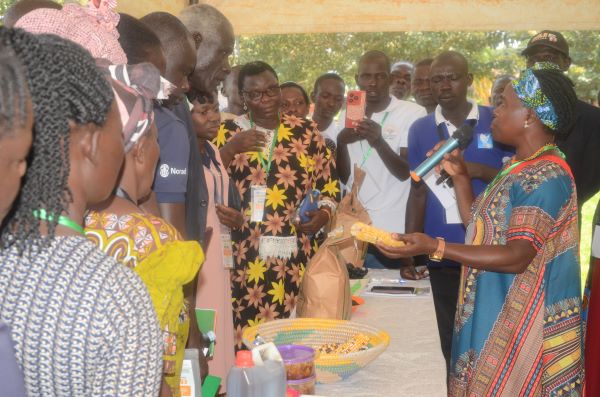SOROTI, October 14, 2024 – Farmers affiliated with the Eastern and Southern Africa Small Scale Farmers’ Forum [ESAFF] have expressed frustration over poor policy implementation, high certification costs, and a lack of value addition machinery, all of which hinder the growth of organic farming in Uganda.
In September 2020, government, through the Ministry of Agricultural Animal Industry and Fisheries [MAAIF], launched the National Organic Agricultural Policy [2019] to recognise the significant potential of organic farming for sustainable food production and improved farmer incomes.
However, Margaret Masudio Eberu, National Vice Chairperson of ESAFF-Uganda recently criticised the government for failing to operationalise the policy meant to boost organic farming in the country, and improve farmers’ incomes.
“Although the National Organic Agriculture Policy exists, it has not effectively supported organic farmers due to its poor implementation,” Masudio stated. She added that many farmers and agricultural extension workers at the sub-county and district levels are unaware of the policy, which remains largely neglected.
Masudio spoke during the 6th Annual National Organic Week [NOW] 2024 celebrations held in Serere district, themed “Promoting Organic Farming as a Pathway to Sustainable Food Production and Climate Resilience.” The event featured farmers demonstrating agroecological methods and showcasing organic products, including plants, crops, and pesticides.
Irene Nakijoba, a board member of ESAFF-Uganda, urged parliament to enact the “Organic Agriculture Act” to enhance support for organic farmers, regulate the use of inorganic inputs, and secure higher premiums for organic products. She emphasized the detrimental effects of inorganic fertilizers on the ecosystem.
Bosco Okiror from Bugondo Agro-ecology Farmers Group in Serere district highlighted the bureaucratic challenges and high costs faced by low-income small-scale organic farmers seeking certification.

“The certification process is lengthy, tedious, and expensive, as it involves inspecting the entire value chain, from seed purchase to handling and storage,” he explained.
Okiror noted that the certification process alone can cost around Shs 2 million, excluding additional expenses for inspection and transportation.
Ephraim Arwata, ESAFF-Uganda mobiliser for Kumi district, called on the government to address the challenges of market access and the lack of value addition machinery for organic products.
He pointed out that despite a global market for organic products, Ugandan farmers struggle to access international markets due to inadequate value addition, forcing them to sell their products at low prices.
In closing remarks, Anthony Seko, Deputy Resident District Commissioner of Serere, encouraged farmers, and agricultural extension workers to share their experiences with organic farming and educate others about its benefits.
He stressed the need for greater awareness among smallholder farmers and called for all sector players to support the adoption of organic practices to enhance food quality and improve consumer health. “Only by doing so can we ensure that small-scale farmers thrive and contribute to a healthier market,” said Seko.
https://thecooperator.news/lira-city-organic-fertiliser-maker-targets-regional-market/
Buy your copy of thecooperator magazine from one of our country-wide vending points or an e-copy on emag.thecooperator.news
-
-
-
-
